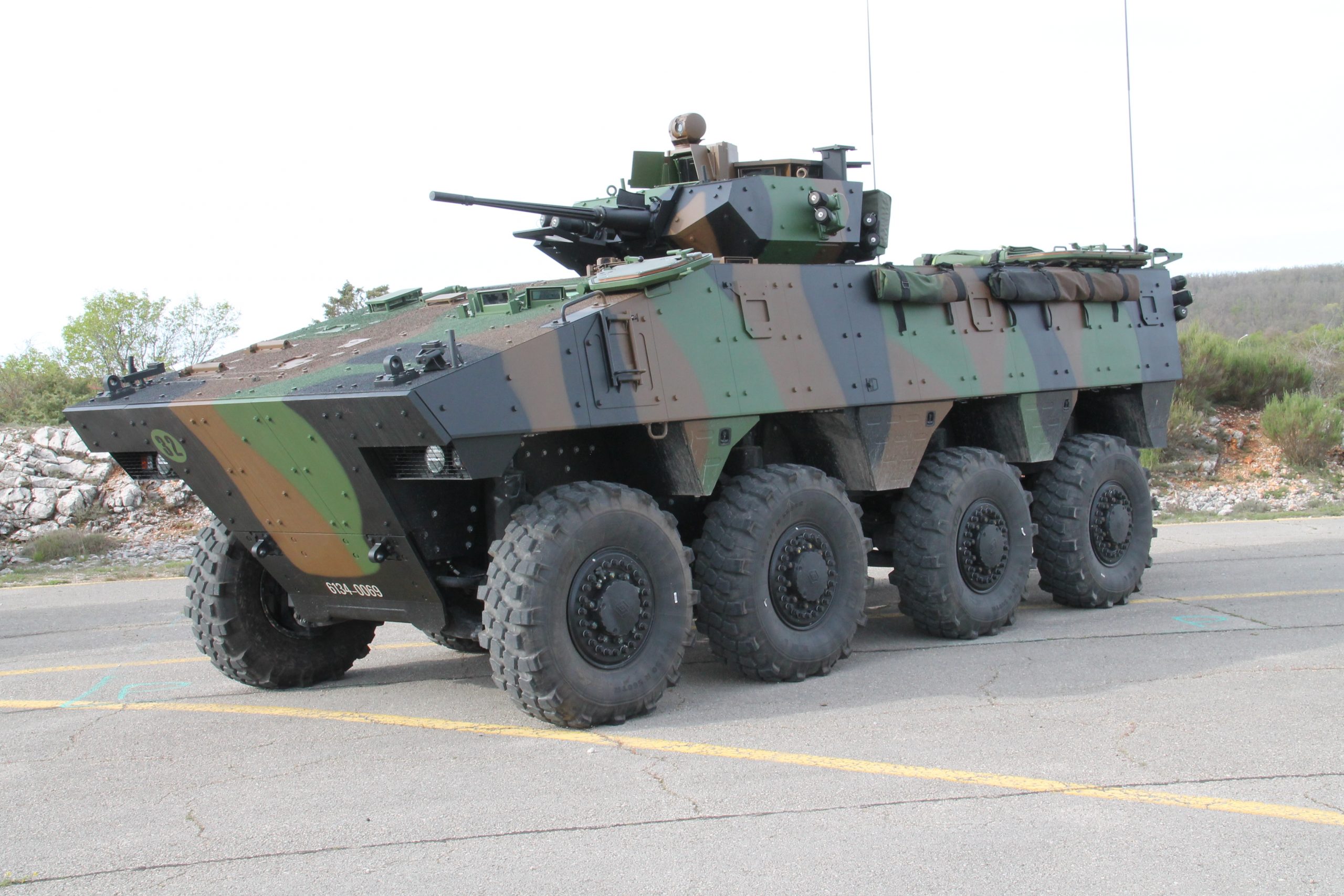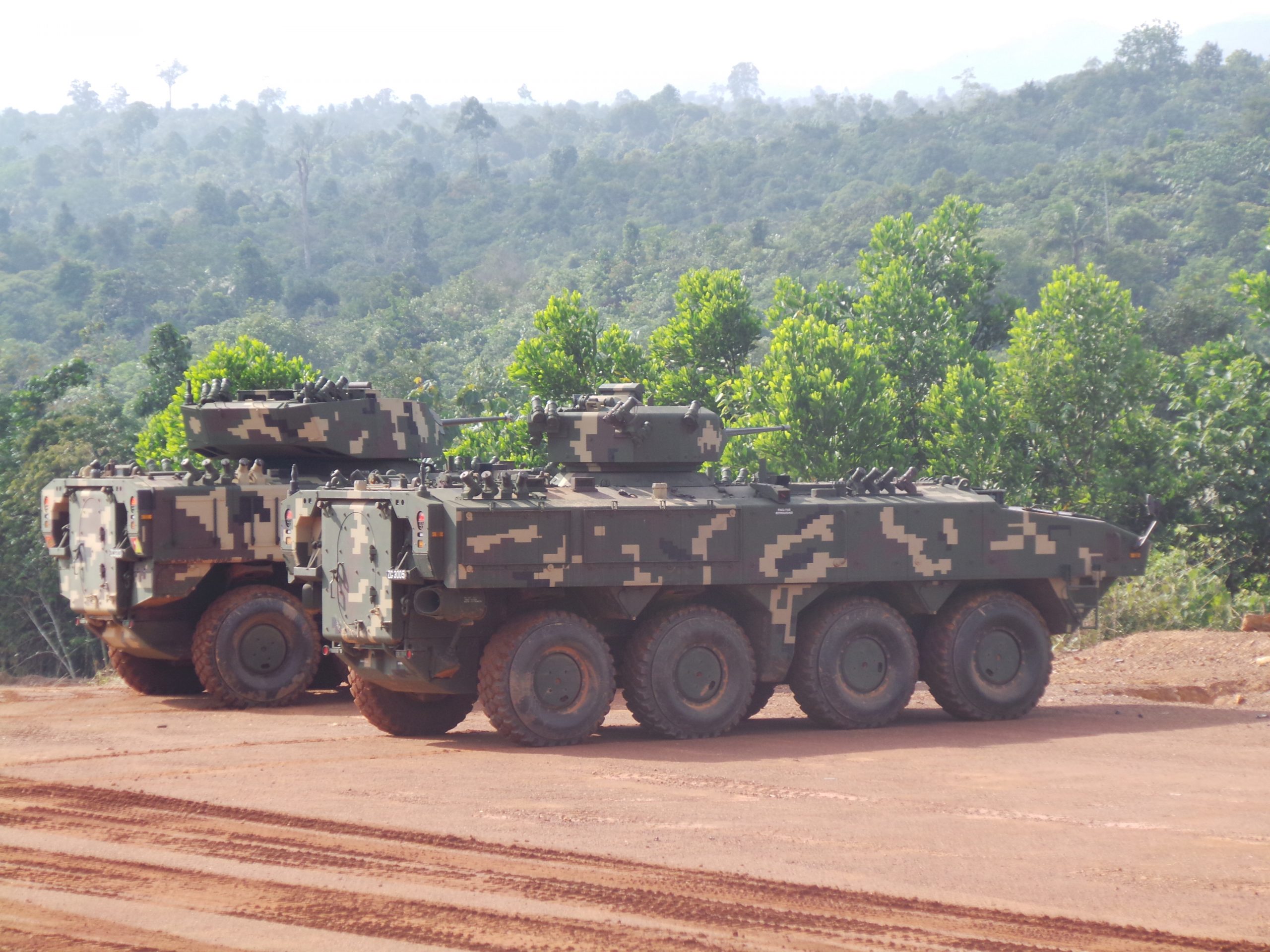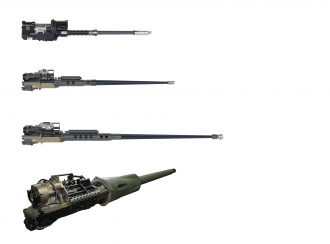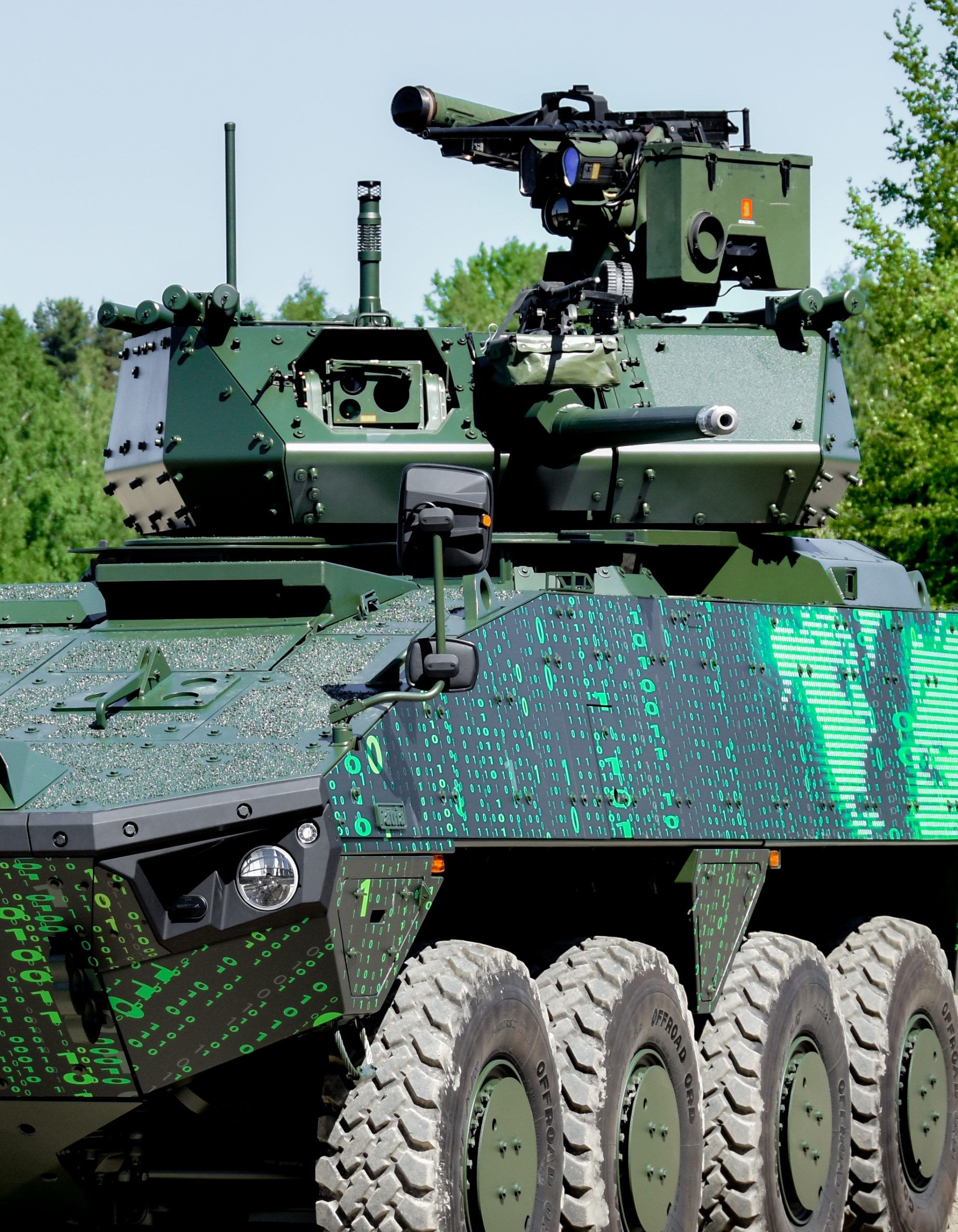
Published in the April/May 2020 Issue – Infantry Fighting Vehicle operators want more punch from their medium calibre cannons – and onboard missiles will increase the number of blows they can deliver.
The latest generation of Infantry Fighting Vehicles (IFV) are being armed with larger calibre weapons which have increased range and fire more effective ammunition.
The main drawback of moving to a larger calibre is that less ammunition is carried but this is offset by the greater effectiveness of the ammunition. Some of these larger calibre weapons are installed in one or two person turrets while others operate in remote controlled turrets (RCT).
A computerised fire control system (FCS) is usually fitted enabling the main armament to engage threat targets when the platform is stationary or moving. The weapon, which is stabilised, is laid onto the target by the gunner and/or the commander who are normally provided with an integrated stabilised day/thermal sighting systems incorporating a laser rangefinder.
While there is some standardisation in members of NATO on larger calibre tank (120mm smooth bore) and artillery (155mm) ammunition there is a complete lack of standardisation in medium calibre weapons in NATO with calibres of 20mm, 25mm, 30mm, 35mm and 40mm currently being deployed.
The opposite is the case for the Russian Army and former members of the Warsaw Pact who use the 30mm 2A42 dual feed cannon. Typical installations including the BMP-2 infantry fighting vehicle (IFV), BMD-2 and BMD-3 airborne assault vehicles (AAV) and many others.
Ammunition
While the main thrust of this article is on the actual weapon, development of ammunition is always on going with medium calibre weapons now firing armour piercing fin stabilised discarding sabot (APFSDS) and air-burst munitions (ABM). The latter are more expensive but are highly effective against dug in infantry.
The British and French armies are standardising on the CTAI 40mm Cased Telescoped Armament System (CTAT). CTAI is a joint venture company between Nexter Systems of France and BAE Systems of the UK with the main weapon production facility at Bourges in France, but ammunition production is undertaken in both countries.
Two British Army platforms are being armed with the 40mm CTAS which are the General Dynamics Land Systems UK Ajax reconnaissance vehicle and the Lockheed Martin UK Warrior Capability Sustainment Programme (WCSP). In both cases the weapon is installed in a two person turret which is also armed with a 7.62mm co-axial machine gun (MG) and in both cases the 40mm CTAS and 7.62mm MG is provided as Government Furnished Equipment (GFE) as it the refurbished 7.62mm MG.
The one French Army platform fitted with 40mm CTAS is the Nexter/Arquus Jaguar (6×6) reconnaissance vehicle which is the replacement for the currently deployed AMX-10RCR (105mm) and Sagaie (90mm) 6×6 armoured cars.
The 40mm CTAS can fire a complete family of ammunition including APFSDS-T, Kinetic Energy Airburst (KE-AB), General Purpose Round – Airburst- Tracer (GPR-AB-T), General Purpose Round – Point Detonating – Tracer (GPRPD-T), General Purpose Round – Kinetic Energy – Tracer (GPR-KE-T) and associated training rounds.
The Nexter 25mm Model 811 dual feed cannon is still being marketed by the company and this is already installed in 520 VBCI (8×8) deployed by the French Army. Export sales of the 25mm M811 have been made to Singapore for the AMX-10P Marines amphibious vehicle and Turkey for some of the FNSS Savunma Sistemleri Turkish Infantry Fighting Vehicle (TIFV).

The Rheinmetall Marder 1 IFV has been in service with the German Army for almost 50 years and is armed with a Rheinmetall 20mm MK 20 Rh 202 dual feed cannon and 7.62mm MG3 co-axial MG. Surplus Marder 1 IFV have been supplied to Chile, Indonesia and Jordan.
Marder 1 is slowly being replaced by the Puma IFV which is fitted with an RCT turret armed with the Mauser 30mm MK 30-2 ABM dual feed cannon with a 5.56mm co-axial MG which will be replaced by a 7.62mm MG. A pod of two MELLS anti-tank missiles (ATM) are to be installed on the left side of the turret.
Australia has ordered the Boxer (8×8) to replace its LAV-25 (8×8) reconnaissance vehicles and one version will be armed with the latest Rheinmetall Lance two person turret armed with Mauser MK 30-2 and7.62 mm co-axial MG.
The original Mauser 30mm MK 30 dual feed cannon is installed in the General Dynamics European Land Systems Ulan (Austria) and Pizarro (Spain) IFV and the Rheinmetall Lance turret installed on four Piranha III (8×8) for the Spanish Marines.
While the Mauser 30mm MK 30 dual feed cannon is gas operated, Mauser has also been working on the Wotan 30mm cannon which is electrically powered.
The BAE Systems Hagglunds CV9040 is the standard IFV of the Swedish Army and is fitted with a two person turret armed with a Bofors 40mm L/70 cannon which is fed from a magazine below holding 24 rounds of ready use ammunition and with the empty cartridge cases ejected through the turret roof.
Export customers for the CV90 IFV have always opted for a different weapon including Denmark (35mm), Finland (30mm), Estonia (35mm), Norway (30mm), Netherlands (35mm) and Switzerland (30mm) with these supplied by the now Northrop Grumman, Armament systems.
While the ideal solution is to have a common medium calibre weapon across the whole AFV fleet, this is not always achieved.
Malaysia, for example, is taking delivery of a complete fleet of Turkish FNSS Savunma Sistemleri Pars (8×8) family of vehicles with production now undertaken in Malaysia by DefTech under the local name of the AV8 Gemita.
The IFV version is fitted with an FNSS Savunma Sistemleri Sharpshooter one person turret armed with a Northrop Grumman, Armament Systems stabilised 25mm M242 dual feed cannon and a 7.62mm coaxial MG while the Armoured Infantry Fighting Vehicle has South African Denel Land Systems LCT 30 two person turret armed with a stabilised 30mm GI-30 dual feed cannon and 7.62mm coaxial MG.

Chain guns
The now Northrop Grumman, Armament Systems ‘Chain Gun’ family of weapons are by far the most widely deployed of any medium calibre cannon in the West and many other parts of the world.
By March 2020 total ‘Chain Gun’ production was rapidly approaching 20,000 weapons, in all calibres, for the home and export markets for air, land and sea applications.
These include the 25mm M242, 30mm M230 (for Apache attack helicopter), 30mm MK44, 35mm Bushmaster III, 50 XM913 and 7.62mm MK52.
The most widely used is the 25mm M242 dual feed cannon which is installed in the US Army Bradley IFV, US Marine Corps LAV (8×8), Canadian Light Armour Vehicle (8×8) as well as many export customers.

Export customers have moved to the 30mm MK44 dual feed cannon and so far well over 20 countries have adopted this for a variety of applications with typical examples being the Bionix II deployed by Singapore and CV9030 deployed by Finland, Norway and Switzerland and Poland for their locally built Patria Armoured Modular Vehicle (AMV) called the Rosomak (Wolverine).
To meet a US Army Urgent Needs Requirement a batch of 83 production General Dynamics Land Systems Stryker LAV (8×8) have been fitted with a Norwegian Kongsberg MCT RCT armed with an 30mm XM813 dual feed cannon that in addition to firing conventional natures of ammunition can also fire the 30mm MK310 Programmable ABM round. This version is called the Dragoon and is only deployed in Europe.
For the US Army’s Next Generation Combat Vehicle (NGCV) the company is developing, in co-operation with the US Army the 50mm XM913 which is based on their proven Bushmaster III 35/50 mm weapon.
For this weapon the company is developing a family of 50mm ammunition which will include armour penetrating, high explosive and a programmable ABM.
As previously mentioned the 30mm 2A42 and to a lesser extent the 30mm 2A72 are the standard Russian medium calibre weapon, but Russi has developed a 57mm calibre weapon which is expected to be deployed in the future. This has been shown in a number of applications including the AU-220M for trials purposes this has been fitted to a BMP-3 IFV and T-15 heavy IFV platform.

Anti-tank missiles
To enable targets to be engaged beyond range of the main armament of IFV, some platforms are also armed with ATM.
The US Army BAE Systems M2 Bradley, IFV for example, has a pod of two Raytheon TOW ATM installed on the left side enabling targets to be engaged out to a range of 3,750m, with more recent TOW versions having a longer range.
The German Marder 1 series IFV had a pintle mounted MBDA MILAN ATM with a maximum range of 2,000m but this is now being replaced by the Eurospike LR ATM which is called the MELLS by the German Army.
The latest French Jaguar (6×6) has a pod of two MBDA MMP ATGM in the right side of the turret which are raised prior to being launched and enable targets to be engaged at a range of some 4,000m. The standard infantry version of the MMP has been already been deployed by the French Army as the replacement for the MILAN ATM.
The Russian Army fitted pintle mounted ATM to its BMP-2 IFV while the BMP-3 IFV has a two person turret armed with a 100mm 2A70 gun which can also fire a laser guided projectile (LGP) and this also has a 30mm 2A72 co-axial dual feed cannon and a 7.62mm co-axial MG.
The United Arab Emirates deploy a large number of BMP-3 IFV and some of these turrets have been installed on a batch of Patria Armoured Modular Vehicle 8x8L which still retains its amphibious capabilities.
The latest Russian T-15 heavy IFV has the same turret as that fitted to new Bumerang (8×8) IFV which in addition to being armed with 30mm 2A42 dual feed cannon and 7.62mm co-axial MG also has a pod of two Kornet laser guided ATM ether side.
Early ATM had a single high-explosive anti-tank (HEAT) warhead but latest models have a tandem HEAT warhead to neutralise threat targets fitted with explosive reactive armour (ERA) but for some ATGW alternative warheads are available including high-explosive fragmentation and thermobaric.
by Christopher F. Foss











